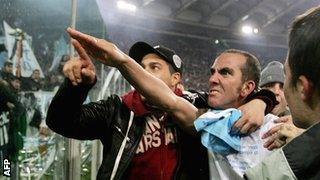Paolo Di Canio, Sunderland and Italian fascism
- Published
Di Canio will not talk about politics
Since Paolo Di Canio replaced Martin O'Neill as Sunderland head coach, his political views, rather than the club's on-going relegation battle, have dominated the headlines.
In a heated news conference on Tuesday, Di Canio, 44, refused to answer questions about his reported fascist beliefs and described the controversy surrounding his appointment as "ridiculous and pathetic".
His club had earlier strongly denied the new manager had racist or fascist sympathies.
BBC Sport explains the background to the row.
Italian fascism explained
Fascism is a political ideology which came to prominence in Italy through the actions of Benito Mussolini, who ruled the country from 1922-1943 as leader of the National Fascist Party.
Mussolini's hard-line authoritarian rule - exemplified by his armed Blackshirts forces - stamped down on left-wing politics and democratic values, as well as forwarding nationalistic policies which promoted Italian sovereignty and tradition.
His alliance with Adolf Hitler's Nazi party saw him bring in anti-Jewish legislation, before he was overthrown following the Allied invasion of the Italian peninsula during World War II.
In Germany, a raft of anti-Nazi laws were enacted after the end of the war, but the situation was not mirrored in Italy's reaction to fascism. As recently as January, controversial former Prime Minister Silvio Berlusconi defended Mussolini.
"The way fascism is seen in the UK is influenced by the British National Party," Alberto Testa, author of Football, Fascism and Fandom: The UltraS of Italian Football, told BBC Radio 5 live.
"The Italian fascist situation is fragmented, with many different interpretations. The brand of fascism I believe Di Canio refers to does charity work in Africa but is very strongly anti-immigration to Italy. I believe Di Canio is not racist."
Where have Di Canio's links to fascism come from?
Rome-born Di Canio has had a lifelong affiliation with local club SS Lazio, the Serie A side also adored by Mussolini.

Di Canio saluting the Lazio fans during the derby with Roma in 2005
Writing in his 2000 autobiography, Di Canio said: "I am fascinated by Mussolini. I think he was a deeply misunderstood individual.
"He deceived people. His actions were often vile. But all this was motivated by a higher purpose."
Di Canio's stance came to attention when he returned to Lazio - the team he began his career with - after he ended a long-spell in British football that included periods at Celtic, Sheffield Wednesday, West Ham and Charlton.
He was fined £7,000 and suspended for one game by the Italian authorities after making the fascist salute for the third time that year in the 2005 derby with AS Roma., external
When quizzed about the straight-arm gesture by Italian news agency Ansa, he was quoted as saying: "I am a fascist, not a racist", and that it was aimed at "my people". Di Canio has since claimed he was misquoted.
Why are Di Canio and fascism dominating coverage now?
This is not the first time that Di Canio's links to fascism have affected his club. While boss of Swindon, trade union GMB withdrew its sponsorship of the team, external and said "it beggars belief" that the Italian was appointed because of his right-wing views.
Paolo Di Canio denies Reading and West Ham links
But it was the resignation of former Foreign Secretary David Miliband from the Sunderland board on Monday, citing the head coach's "past political statements", that reignited the debate.
As a city forged by the shipbuilding and mining industries, Sunderland has a long history with left-wing politics and trade unions, two institutions directly opposed to Mussolini-inspired fascism.
It has historically been considered a safe seat for the Labour party and currently 64 of its 75 city councillors come from the Labour Party., external
Already, a Facebook page set up in protest since Di Canio's arrival on Sunday, external has gained more than 3,000 supporters.
The Durham Miners' Association has promised to write to Sunderland to demand the return of the Wearmouth Miners' Banner on loan at the Stadium of Light, with general secretary Dave Hopper releasing a statement saying the decision to appoint Di Canio is "a disgrace and a betrayal of all who fought and died in the fight against fascism"., external
Similarly, councillor Paul Watson, leader of Sunderland City Council, has voiced his "moral" concerns about the Italian's arrival., external
Will it affect Sunderland's bid to avoid relegation?
Despite the negative attention, Di Canio insisted he would "bet everything" on leading Sunderland to survival and was confident of winning over his critics.
"It was the same for a different reason at Swindon," Di Canio added.
"After two months, there were 9,000 people at the end of the game clapping their hands for my players and singing my name."
However Di Canio faces an arguably more testing time at Sunderland on the pitch. The Black Cats have not won in eight games and sit one point above the Premier League relegation zone with seven matches remaining.
The first of those matches is away to Champions League-chasing Chelsea on Sunday.
- Published2 April 2013
- Published1 April 2013
- Attribution
- Published1 April 2013
- Published31 March 2013
- Attribution
- Published30 January 2013